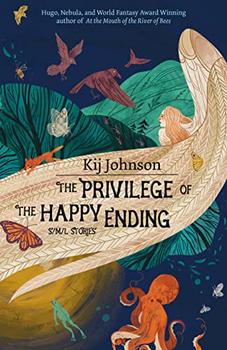Summary | Excerpt | Reviews | Beyond the Book | Readalikes | Genres & Themes | Author Bio

Small, Medium, and Large Stories
by Kij JohnsonExcerpt
The Privilege of the Happy Ending
This is a story that ends as all stories do eventually, in deaths.
When Ada's parents died in the winter of her sixth year, she was sent to the neighboring parish to live with her aunt, Margery. Margery was a widow with three daughters, all older than Ada; and their names were Cruelty, Spite, and Malice. They lived in a narrow cottage with a single room, and rain came in where the thatch had grown thin beside the falling-down chimney. Margery had a garden and a pig and some piglets, and three sheep, though one was old. There was also a coop full of hens with a single rooster. There was no room for an orphan in Margery's narrow cottage, nor in her narrow gray life, so Ada slept in the coop surrounded by the chickens: their feathers and fluff, their earthy smell, their soft nonsense gabbling—and of everyone in that household, Ada's food was scantest but her bed was softest.
Ada loved all the hens, but her favorite was Blanche, white as a pearl and sturdy as a peasant's ankle, with five bright white nails on each ivory foot, and a beak the pink of tender rosebuds in May, and a flat little comb and wattle the crimson of full-blown roses in July. She was as pretty as an enameled jewel made for a duke, yet her golden-black eyes were clever as clever. Blanche's egg-laying days were past, but it was Ada's task to collect the eggs and tell her aunt who was laying and who was not; and so Blanche was not eaten.
There was a day after the hay had been brought in but just before the fringed golden wheat was ready for the sickle. After Margery and the sisters broke their fast, the porridge pot had been nearly empty (and the rest needed for dinner); so once Ada had fed the hens and collected the eggs, she went into the old forest to find something from which she might make her own meal. But she knew it was dangerous to go alone, and so she took Blanche.
The road became a path as it crossed into the shadows of the old forest. Ada was gleaning sweet musty blackberries and bitter-bright burdock greens (too late in the season, but there they were, and thus worth trying) until Blanche saw the feathery little leaves of kippernuts tucked close to an oak tree's roots. Ada squatted to dig the tiny tubers from the ground, and carefully brushed them free of dirt. She had two for each one Blanche took. They agreed this was only fair, for she was bigger and had done the work.
Ada had eaten six-and-twenty kippernuts (and Blanche thirteen) when they heard someone running along the path-that-was-a-road. The news that comes on fast feet is seldom good but is always important, so Ada leapt up, and Blanche scurried from her bug-scratching to press close, peeking around her legs. But it was just a boy that burst into sight, heaving and panting and out of breath: older than she, thin and dressed poorly (for he was an orphan as well), and running on bare feet beaten hard as bootsoles.
When he saw Ada, he paused, gasping until he could speak at last. "Where. Is your father? I have. News that is. Worth. A penny or more."
"I have no father, but I have an aunt. She lives that way." Ada pointed along the path.
"Is there a. Village? I don't want to. Waste my time."
"There's a church and a miller and a blacksmith," said Ada, looking up at him. "What news is worth a penny?"
"Do you have. A penny?" said the boy.
She shook her head. "I have a chicken, and I have this pin. My mother gave it to me before she died." She pulled it from her collar to show it to him: fine as a hair and straight as a thread pulled tight, with a tiny silver knob at one end.
"A chicken's too heavy," he said but plucked the pin from her fingers, though she had offered neither. "It's wastoures! They came through Newton and Blackhill and killed everything. And then they split into two big groups and one turned north, and the other's coming here. I stay ahead of them and earn pennies by warning people."
Excerpted from The Privilege of the Happy Ending by Kij Johnson. Copyright © 2023 by Kij Johnson. Excerpted by permission of Small Beer Press. All rights reserved. No part of this excerpt may be reproduced or reprinted without permission in writing from the publisher.
At times, our own light goes out, and is rekindled by a spark from another person.
Click Here to find out who said this, as well as discovering other famous literary quotes!
Your guide toexceptional books
BookBrowse seeks out and recommends the best in contemporary fiction and nonfiction—books that not only engage and entertain but also deepen our understanding of ourselves and the world around us.